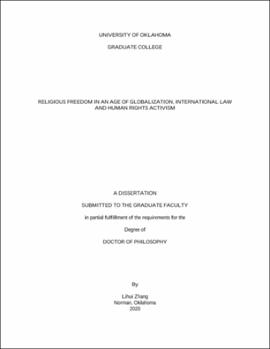| dc.contributor.advisor | Barry, Colin | |
| dc.contributor.advisor | Hertzke, Allen | |
| dc.contributor.author | Zhang, Lihui | |
| dc.date.accessioned | 2020-05-08T21:00:36Z | |
| dc.date.available | 2020-05-08T21:00:36Z | |
| dc.date.issued | 2020-05-08 | |
| dc.identifier.uri | https://hdl.handle.net/11244/324347 | |
| dc.description.abstract | This study reveals the two dimensions of religious freedom – religious groups and individuals – with empirical data, and it offers theoretical arguments on how these two dimensions are different. Individual rights provision is less threatening to dominant societal factions and the state, but abusing these rights is also less visible; group rights provision is more threatening to dominant societal factions and the state, but abusing these rights is also more visible. International forces – international law, human rights organizations, and globalization - influence the protection of the two dimensions of religious freedom differently. Globalization as a general force is fueling nationalist backlash and challenging states’ authority, causing governments to impose new restrains on religious rights – particularly those at the group-level. However, the ratification of ICCPR leads to a better protection of religious rights for groups but not for individuals, because restrictions of groups are in the public and easier to be observed, thus imposing a bigger reputational cost on states under the international legal commitment. Similarly, the domestic presence of International Human Rights Organizations (HROs) improves rights protection for religious groups but not for individuals, because HROs are able to reduce the political repercussions religious groups face from social movement activism. Nevertheless, there is also a solution to the restrictions on religious individuals; naming and shaming campaigns provide new information to the international audience and expose the covert regulations on religious individuals, therefore, they increase reputational costs for rights violating states. | en_US |
| dc.language | en_US | en_US |
| dc.rights | Attribution-NonCommercial-NoDerivatives 4.0 International | * |
| dc.rights.uri | https://creativecommons.org/licenses/by-nc-nd/4.0/ | * |
| dc.subject | Religious Freedom | en_US |
| dc.subject | Human Rights | en_US |
| dc.subject | International Law | en_US |
| dc.subject | International Human Rights Organizations | en_US |
| dc.title | RELIGIOUS FREEDOM IN AN AGE OF GLOBALIZATION, INTERNATIONAL LAW AND HUMAN RIGHTS ACTIVISM | en_US |
| dc.contributor.committeeMember | Workman, Samuel | |
| dc.contributor.committeeMember | Gross, Miriam | |
| dc.date.manuscript | 2020-05-07 | |
| dc.thesis.degree | Ph.D. | en_US |
| ou.group | College of Arts and Sciences::Department of Political Science | en_US |
| shareok.nativefileaccess | restricted | en_US |

